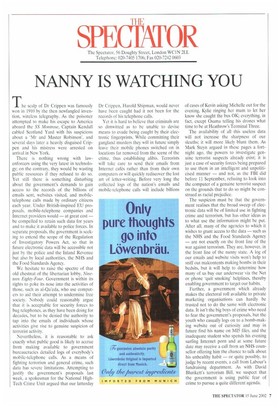NANNY IS WATCHING YOU
The scalp of Dr Crippen was famously won in 1910 by the then newfangled invention, wireless telegraphy. As the poisoner attempted to make his escape to America aboard the SS Montrose, Captain Kendall cabled Scotland Yard with his suspicions about a 'Mr and Master Robinson', and several days later a heavily disguised Crippen and his mistress were arrested on arrival in New York.
There is nothing wrong with lawenforcers using the very latest in technology; on the contrary, they would be wasting public resources if they refused to do so. Yet still there is something disturbing about the government's demands to gain access to the records of the billions of emails sent, websites visited, and mobiletelephone calls made by ordinary citizens each year. Under British-inspired EU proposals, mobile-telephone companies and Internet providers would — at great cost — be compelled to retain such data for years and to make it available to police forces. In separate proposals, the government is seeking to extend the scope of the Regulation of Investigatory Powers Act, so that in future electronic data will be accessible not just by the police and the Inland Revenue but also by local authorities, the NHS and the Food Standards Agency.
We hesitate to raise the spectre of that old chestnut of the libertarian lobby, Nineteen Eighty-Four. Government is within its rights to poke its nose into the activities of those, such as al-Qa'eda, who use computers to aid their attempt to undermine free society. Nobody could reasonably argue that it is acceptable for security forces to bug telephones, as they have been doing for decades, but to be denied the authority to tap into the emails of individuals whose activities give rise to genuine suspicion of terrorist activity.
Nevertheless, it is reasonable to ask exactly what public good is likely to accrue from making available to government bureaucracies detailed logs of everybody's mobile-telephone calls. As a means of fighting terrorism and general crime, such data has severe limitations. Attempting to justify the government's proposals last week, a spokesman for the National HighTech Crime Unit argued that our latterday Dr Crippen, Harold Shipman, would never have been caught had it not been for the records of his telephone calls.
Yet it is hard to believe that criminals are so dimwitted as to be unable to devise means to evade being caught by their electronic fingerprints. While committing their gangland murders they will in future simply leave their mobile phones switched on in locations far removed from the scene of the crime, thus establishing alibis. Terrorists will take care to send their emails from Internet cafés rather than from their own computers or will quickly rediscover the lost art of letter-writing. Before very long the collected logs of the nation's emails and mobile-telephone calls will include billions of cases of Kevin asking Michelle out for the evening, Kylie ringing her mum to let her know she caught the bus OK; everything, in fact, except Osama telling his drones what time to be at Heathrow's Terminal Three.
The availability of all this useless data will not increase the sharpness of our sleuths; it will more likely blunt them. As Mark Steyn argued in these pages a fortnight ago, the powers to investigate genuine terrorist suspects already exist; it is just a case of security forces being prepared to use them in an intelligent and unpoliticised manner — and not, as the FBI did before 11 September, refusing to look into the computer of a genuine terrorist suspect on the grounds that to do so might be construed as racial prejudice.
The suspicion must be that the government realises that the broad sweep of electronic data will be of limited use in fighting crime and terrorism, but has other ideas as to what use the information might be put. After all, many of the agencies to which it wishes to grant access to the data — such as the NHS and the Food Standards Agency — are not exactly on the front line of the war against terrorism. They are, however, in the front line of the nanny state. A log of our emails and website visits won't help to sniff out malcontents making bombs in their bedsits, but it will help to determine how many of us buy our underwear via the Net or phone 'quit smoking' helplines, thereby enabling government to target our habits.
Further, a government which already makes the electoral roll available to private marketing organisations can hardly be trusted not to do the same with electronic data. It isn't the big boys of crime who need to fear the government's proposals, but the youth who casually logs on to a bomb-making website out of curiosity and may in future find his name on MI5 files, and the inadequate student who spends his evening surfing Internet porn and at some future date may receive a call from an NHS counsellor offering him the chance to talk about his unhealthy habit — or quite possibly, to judge by recent events, a call from Labour's fundraising department. As with David Blunkett's terrorism Bill, we suspect that the government is using public fear of crime to pursue a quite different agenda.


































































 Previous page
Previous page